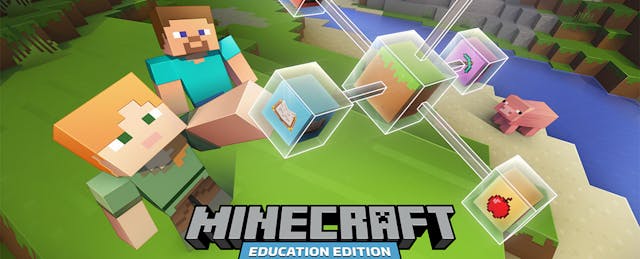Seventeen months after acquiring Minecraft, Microsoft is adding another building block in its efforts to expand its presence in classrooms.
The Redmond, Wash.-based company has acquired MinecraftEdu, a version of the popular open-world, sandbox game modified specifically for the classroom by TeacherGaming. And its creator couldn’t be happier.
“What the deal comes down to,” Joel Levin, co-founder of TeacherGaming, tells EdSurge, “is that more teachers and students are going to have the Minecraft experience in their schools and come up with new, creative ways to educate.”
An early advocate for using Minecraft in the classroom, Levin’s evangelism for the game soon earned him the nickname “Minecraft Teacher.” In 2011 he co-founded TeacherGaming and secured the rights from Mojang, the company behind Minecraft, to modify and sell the game to schools. Today, MinecraftEdu is used in more than 7,000 classrooms across more than 40 countries for lessons on topics ranging from proteins to Egyptian pyramids.
Shortly after Microsoft forked out $2.5 billion to buy Mojang in September 2014, the software giant began talking with TeacherGaming to formulate an education strategy. The conversations that led to the sale of MinecraftEdu had “twists and turns,” says Levin, but he’s ultimately happy because “Microsoft has the resources, the reach and the platform to get Minecraft into a huge number of classrooms that we ourselves could never reach.”
The deal will transfer all assets related to MinecraftEdu—the game along with supplemental teaching resources—to Microsoft. Levin assures current MinecraftEdu users that TeacherGaming will continue to provide technical support and keep the game servers running for schools. But the game itself “will not be actively developed past a certain point,” he says. He did not offer a specific timeframe.
Microsoft plans to roll many of MinecraftEdu’s features into a new offering, Minecraft: Education Edition, scheduled for release in summer 2016. Updates in this version will include personalized avatars, multiplayer support for up to 40 students, and a portfolio feature that allows students to take pictures to document their creations.
Existing MinecraftEdu customers will get a free license to Minecraft: Education Edition for the first year. Microsoft plans to charge other schools $5 per student per year, with volume discounts available for bulk purchases. The company is also building a community portal that offers free lesson plans and support from “Minecraft mentors” to help introduce the game to new teachers.
Microsoft has high hopes that Minecraft can woo schools and districts to its other educational offerings such as Office 365, which is under increasing competition from similar tools offered by Google. Minecraft: Education Edition will likely require users to have Office 365 accounts; an FAQ about the deal claims that schools and districts with Office 365 “will be three clicks from getting Minecraft” once the education version is released this summer.
Space: The Next Frontier
Financial terms of the deal were not disclosed, but it doesn’t mean TeacherGaming is taking a break. Even before the sale, the company of 12 had been working on modifying another game for the classroom: Kerbal Space Program, a physics simulator where players design spacecrafts and manage a space exploration program.
Kerbal is popular among the indie gaming and science communities—NASA engineers and Elon Musk are fans of the game—although casual players have complained about its high learning curve. But that doesn’t concern Levin, who notes that the game is already used by high school teachers to help teach concepts around physics and engineering.
Expect KerbalEdu to retain the same open-endedness as MinecraftEdu. The key to successfully modifying games for the classroom, says Levin, is to turn them into a flexible tool that teachers can use to create their own lessons, regardless of the subject. “It’s very tempting to look at a game, look at existing curriculum, and find a way to shoehorn the game into that curriculum,” he notes. But prescribing specific lesson plans for games “leaves so much on the table for what teachers can do.”
“Our mission is to bring great entertainment games into the classroom,” adds Levin, “and we’re trying to expand our portfolio to other games. We are really excited to work on a game that’s not called Minecraft, and see if we can still capture some of that magic.”


